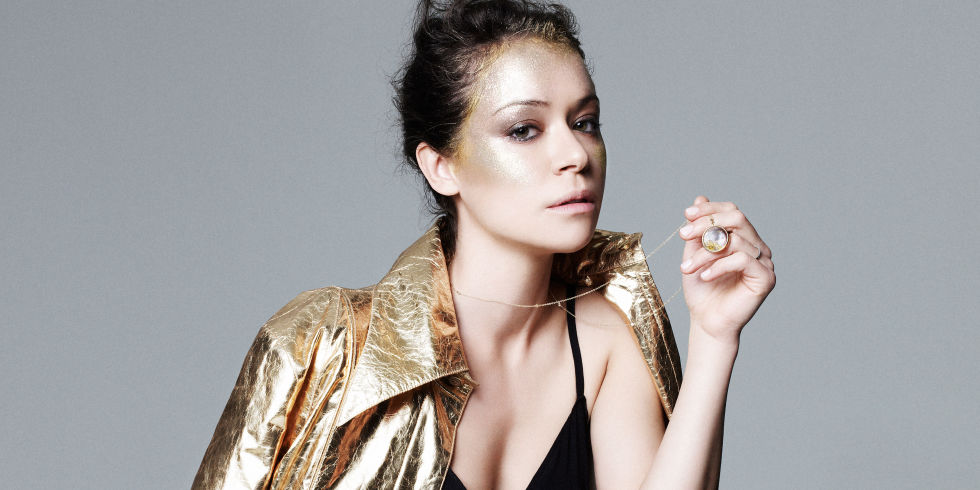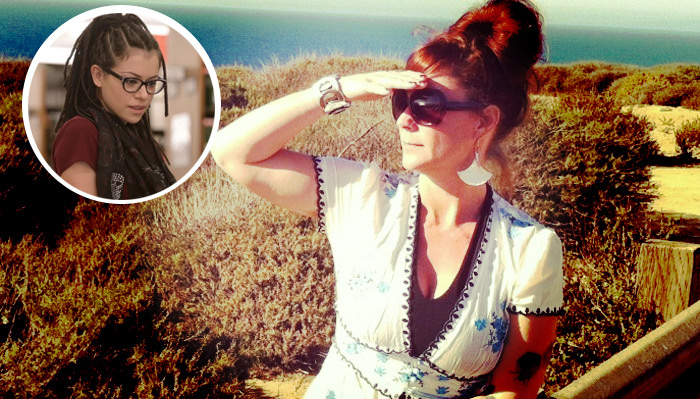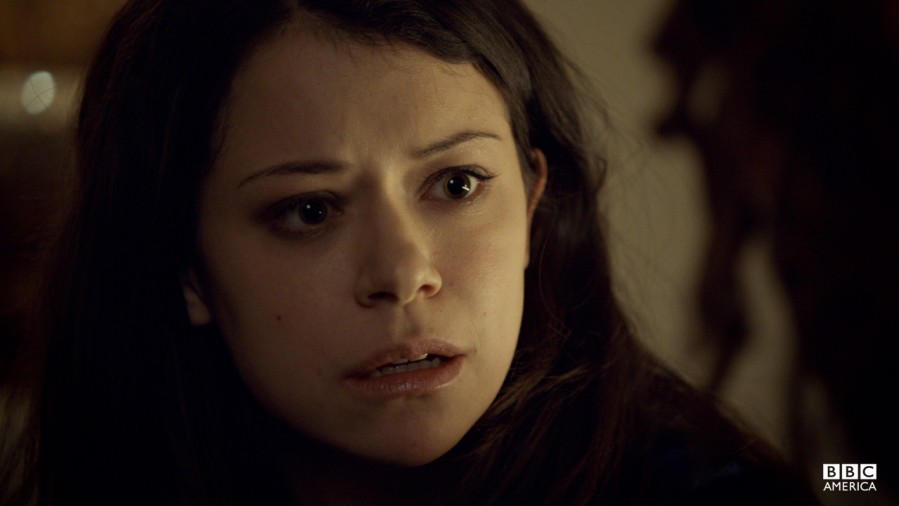Nerds are a weird breed. We do things… compulsively. Impulsively. Repeatedly. Obsessively. We just, embrace our lives with a certain verve that could lead to regrets.
You know what I mean. Mountain Dew induced gut rot regret on a Wednesday morning at work from a long-night of binge watching Doctor Who on Netflix the night before.
Here are the things I just refuse to regret as a nerd:
Why write this? Well, because I want to get beyond just not regretting these things. I want to … celebrate them. So awesome. Take those slightly embarrassing nerdy things you do and turn that on its head. Instead, shout it out and be weirdly parade-levels of proud.
It’s April, which means one thing: Orphan Black is coming back. Since my Clone Club obsession is about to completely take over every conversation I have between now and the end of the third season, it seems now is the perfect time to celebrate Maslany’s awesome feminist status:

From the BBC’s Cloneversation:
“So often the male perspective is our default perspective in television in film and in all kinds of different media and I think what this show does is it just goes, ‘nope.’ Women can be all these different things. It’s played by the same actress but we have the potential for so many things and not defined by how we look necessarily because it’s just me…I don’t feel responsible, I feel proud of it.”
From her New York Times profile:
She called me out — rightly, and in the nicest way possible — for internalized sexism when I compared Tina Fey unfavorably with Amy Poehler. “You don’t pit the Coen brothers against each other, you know what I mean?”
From her AdWeek interview:
“The characters [in Orphan Black] all have a complexity to them, an unapologetic individuality. They’re not physically superhuman and emotionless and without flaws. Having a strong female character doesn’t mean she’s beyond suffering and fragility. There’s a fearlessness. That to me is strong writing for women. It defies gender.”
From the Women Who Kick Ass Panel at San Diego Comic Con 2014:
“A lot of different men will come on as day players or guest parts, and I recognize that there’s a certain strength that I have now, or a certain command that I have being one of the leads on the show that I hadn’t had before… Just owning that space and not being expected, as a woman, to shrink, or curtsy, or any of those sort of things.”
When she dressed up as Rosie the Riveter for Halloween:
From her interview with Entertainment Weekly:
“We sort of embrace the idea of every human having the potential to be anything, and I think that opens the door for all kinds of dialogue about sexuality and about gender. And it’s exciting material that is not always on screen in a respectful way. And I don’t mean respectful in the sense of martyrdom, I mean respectful in the sense of flawed, complex performance and characters.”
From her Twitter feed:
. @OrphanBlack supports women in science. Help show your support too! Buy a song!! http://t.co/1S1NpTEcXt #Cophine
From her interview with National Public Radio:
“That always resonated for me as a woman to have this idea of our bodies not being our own,“ she says. "That they’re owned by someone else. That the image of them is owned by someone else. I feel that’s a very resonant theme for young women like myself, and especially women in this industry.”
From her Variety Q&A:
“For me it’s about the parts that are out there. I think it’s changing. That’s where I feel the sexism the most. The stories that we tell are male stories and often male-centric and the women are accessories, but it is changing. It’s changing so rapidly. … Our voices are getting louder. People are realizing that our stories are just as universal and just as relatable as male stories.”
From her Elle Magazine Interview:
“It can sound precious to say that we’re exploring the potential of every woman to be anything, but I truly believe that’s what we’re doing.”
I really believe in the power of asking. Want that job? Ask. Want a better price on that rad vintage bar cart? Ask. Want to go to happy hour with the woman who inspired one of your favorite characters on one of your favorite television shows ever? Yeah, I totally asked.

I invited Cosima Herter out for a drink, never expecting an answer. To my delight and surprise, she was lovely and obliged me. For those who need an education, she’s the science consultant for Orphan Black, which returns this Saturday on BBC America. In addition, she serves as the inspiration for a character who shares her name. And while I definitely asked her about the fictional Cosima, I was most amazed by the real person. A professor at the University of Minnesota, we shared many of the same passions. Finding ways to get girls interested in science. A mutual love of British television. And most importantly, a desire to show a more diverse and real set of women on television. With her role in Orphan Black, it’s clear she’s having an influence.
Q. When Graeme first came to you with Orphan Black, what struck you about it?
A. When Graeme first talked to me about the story he’d been working on, it was still in a really conceptual stage. Interesting and exciting, to be sure – but really only a concept. Graeme is an extraordinary thinker, with such remarkable wit, and this story was all the more exciting to me because some of the ideas that he was pondering were pretty in-line with both my own research at school at the time, and ideas that I love thinking about more generally. It was fascinating to observe how we thought about some of the very same issues, but in such different ways. Graeme has such a dark, hilariously distorted take on things! So I was really happy about the fact that we had this unlikely convergence of interests because we’d been friends for a long time, but it was the first time our respective work crossed intellectual-paths. And since we have both always been very busy with our own different projects, a lot of time could pass between moments when might be able to have conversations about it – just passing around and musing about ideas… like: Darwin, evolution, biotechnology, genetic engineering, and all manner of social, political, historical, and philosophically related issues. I think, in an oblique sense, the most striking thing is that Orphan Black became a vehicle for all kinds of interesting conversations between Graeme and I over the longue durée. I love nothing more than to have conversations about ideas!
Q. It’s exciting that the show runners wanted the science to be accurate - why is that important to you and how do you ensure it’s narratively interesting while still being representative of reality?
A. You’re right, it IS important to me (to all of us, I think). But it’s also a fictional narrative, not a documentary. So I don’t get stringently protective about the exactness or accuracy when there’s a reason to make some of the science far more elastic than it realistically could be (like, for example… oh, I don’t know… human clones running around!). That being said, we are quite conscientious about trying to represent the issues around cloning, evolution, eugenics, genetic engineering, synthetic biology, patenting, etc in a way that does map onto real life. Most of these issues truly are current, and actually functional realities to some degree. They are already profoundly provocative in their own right without needing to be fictionalized! Bio-scientific experimentation, for example – even if it fails – is still science (we’re not saying it’s always good science, however!). It’s important to keep in mind that most of the discoveries in biology we depend on regularly – not least insofar as medicine is concerned – have found success only after a long history of, sometimes bizarre, experimentation. And they also need to be understood in their historical context. One of the things that is most important to me is to represent the philosophical issues by showing just how complex they are, that there are no easy ways to analyze them. And they need to be represented in unusual and thought-provoking ways that actually speak to how multi-dimensional they are. I’m not capable of solving any of these issues, but I do want to put a little bee in viewers’ bonnet’s so that they’ll be stimulated enough to think and talk about them in ways they may not have done otherwise.
Q. The clones are all strong women and yet are all deeply different. In your view, how much of it is their “shared nature” and how much is nurture?
A. Well, insofar as clones (or twins for that matter) are concerned, no two organisms, despite having the same genes, would be exactly identical – not physically, and certainly not psychologically. Development, for example – embryonically and throughout one’s life – plays a very important role as well. So the question can’t really be boiled down to nature/nurture. It’s a common trope to reduce, especially humans, to this simple dichotomy, and while we do play on this somewhat, we also want to show just how complicated that idea is. The women of Orphan Black are complex characters – they develop, grow, love, learn, evolve – just like ‘real’ people do. I am an unapologetic feminist, and there are LOTS of different kinds of women – this can’t be boiled down to biology alone. If we are left with only the formula of nature/nurture, then we’d be stripped of all personal agency. I’m also an unapologetic existentialist. So, certainly we are subject to the machinations of our bodies, subject to our physical & psychic environments, but I like to believe that we also have some measure of agency to make choices, effect change in the world, and assert a kind of selfhood and subjectivity that derives from a rich-inner life and our experiences in the world. The idea that we are fully determined by factors we can’t control makes me feel stripped of that agency. The female characters of Orphan Black have a lot of strength, courage, creativity, and willfulness that is often denied women in media portrayals – that’s really exciting to me.
Q. If you found out you were a clone, what would you do? Would you react like Cosima and try to get to the bottom of the science? Or would you be more like Sarah and go undercover? Or do you think you’d be more like Allison and become suspicious of everyone?
A. If I met a clone of myself – or of anyone, for that matter – I probably would react most like Cosima. I think that yes, I would be interested in the physical science of her creation, but more likely I’d be curious as to the psychology of why someone created clones in the first place. I’m more of a curious than paranoid person. And unless someone was actually trying to assassinate me, I can’t see any reason why I’d run away from her!
Q. Who is your favorite clone and why?
A. Allison! Most definitely Allison. She and I couldn’t be more different, but I love how difficult, multifaceted, unpredictable, and unprecedented of a character she is. I think that while Tatiana’s portrayal of her is brilliant for how hilarious Allison is, it’s even more so because it’s very, very sensitive and nuanced. She’s not a cartoon, she’s no joke. She’s fierce and capable and competent, and richly unique.
Q. Cosima is loosely based on you, so what qualities do you and Cosima share?
A. The hand-wavey, pacing around, going off on tangents about all kinds of weird things while she talks, is a similar characteristic (one that my friends often tease me about). She’s cheeky, mischievous, curious about everything, and sincere – I think that’s pretty true-to-life. And, the “I’m kind of always late, so I’m kind of always sorry” is embarrassingly accurate. She definitely has a better wardrobe, and much nicer apartment than I do! I’ve never had dreadlocks (although I did consider it many, many years ago). Cosima and I do listen to similar music, but I’m a child of the ‘70’s and I love most dancing to more disco, funky, bass-driven, hip-grindy type music.
Q. When you see Tatiana Maslany playing Cosima, do you recognize anything she may have directly picked up from your personality? If you feel comfortable sharing, what are those little easter eggs for viewers?
A. That’s really difficult for me to say. When I see Cosima I don’t think about her as some kind of iteration of me – she’s a fictional character that Tatiana plays beautifully. I really try not to think about it too much, it’s just too surreal. More than once I’ve turned to Graeme after seeing/hearing Cosima do or say something, and laughed “that really does sound like something I would say!” to which he’d respond, “well, that’s because you actually did say that!” But, if I think about it too much, I begin feeling strangely self-conscious about it, so I have to remain pretty detached. She’s the most difficult character for me to form an unbiased opinion about (not that I’m really unbiased about any of them – I love them all). I try not to look for similarities because it kind of makes me feel a bit weird. Instead I just admire how remarkable the writers and Tatiana are at bringing her to life.
Q. What can people look forward to in Season 2?
A. Pure awesomeness!
Had the Orphan Black panel at San Diego Comic Con been scheduled sometime in the last 60 days instead of months ago, the show’s first panel would have been in a much larger room. Fans crowded into a tiny room 7a for their first chance to hear from the cast and crew, fresh of their first panel ever at Nerd HQ (which you can watch in full here) across the street.
Fans were not disappointed and the cast and crew brought plenty of new details on season 2 to share.
Director John Fawcett said season 2 will likely air in April 2014. When the show comes back, fans will be treated to a two-part episode, much like the series premiere from Season 1.
When the show returns, Fawcett said there are plans for the show to introduce new clones. However, writer and co-creator Graeme Manson said it’s unlikely the show will spend much time going into the past of any of the current clones. The pace of the show is set up to always be moving forward, he said, but there is one exception. The writers have talked about introducing a “Beth episode,” to give viewers insight into her life before her suicide. However, it’s not likely to appear in Season 2.
Jordan Gavaris, who plays the hilarious Felix, says he would also be interested in playing a cloned version of himself if the show called for it.
SPOILER ALERT.
In the final moments of the first season, Cosima discovers that there is a patent pending on the clones’ genetic material. Weeks later, the Supreme Court decided that no human genetic material could be patented in the United States. Manson said the show is likely to integrate the court’s decision, because it may potentially change how the storyline plays out in the second season.
The show and its stars are also clearly proud of the online fans and their passion for the show. Maslany, in particular, said she was impressed with the volume of critical essays on the show:
“There’s feminist writers writing about the theme’s of the show … exploring the individuality of these women and all that kind of stuff, which speaks really to my heart and was really exciting for me.”
One thing’s for sure after the show’s first successful Comic Con, Orphan Black fans are growing, passionate and ready for more.
So the last episode of the first season of Orphan Black airs in a little less than an hour here and I can honestly say it’s been the biggest entertainment surprise of 2013 so far. Indeed, BBC America knew what they were doing when they came up with Supernatural Saturday. I can’t even believe I am writing this right now, but by the fourth week of their regularly scheduled sci-fi spree, I started looking forward to seeing Sarah, Felix and the clone crew a bit more than the Doctor. I know. I know. But it’s true.

Here’s five very good reasons why:
1. Tatiana Moslany: I know I am not the only person making this prediction, but Moslany is on the verge of being absolutely huge. She manages to bring out the most subtle emotions in each of the clones she plays and the way she uses her eyes as a central identifier between characters is so delicate and genius that I want to scream “Emmy! Emmy! Emmy!” every time I see that right eyebrow arch for Sarah or those lids blink rapidly for Alison. She truly makes the show what it is.